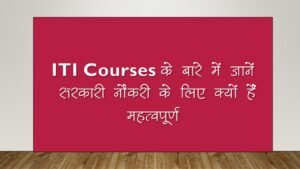
ITI क्या है (ITI Kya hai)
ITI का मतलब होता है “Industrial Training Institute” (औद्योगिक प्रशिक्षण संस्थान)। ITI, एक व्यावासायिक प्रशिक्षण संस्थान होता है जो छात्रों को विभिन्न व्यावसायों में प्रैक्टिकल कौशल प्रदान करता है। ये कोर्स सामान्यत: 6 महीने से 2 साल तक के होते हैं, और इनमें तकनीकी और गैर-तकनीकी ट्रेड्स शामिल होते हैं।
ITI Courses आमतौर पर हाई स्कूल की शिक्षा के बाद किए जाते हैं और इनका फोकस विशिष्ट Trades से संबंधित सीधे कौशल पर होता है। जैसे कि इलेक्ट्रीशियन, फिटर, मशीनिस्ट, वेल्डर, कंप्यूटर ऑपरेटर, कारपेंटर, आदि।
Eligibility for ITI Courses
ITI (औद्योगिक प्रशिक्षण संस्थान) के कोर्स में प्रवेश के लिए योग्यता मामले में कुछ महत्वपूर्ण जानकारी निम्न प्रकार हैं। सामान्यत: इन्हें ध्यान में रखना चाहिए:
- शैक्षिक योग्यता:
- आमतौर पर, ITI कोर्सों के लिए न्यूनतम शैक्षिक योग्यता 8वीं, 10वीं या 12वीं कक्षा की पूरी होनी चाहिए, जो ट्रेड के आधार पर भिन्न हो सकती है।
- आयु सीमा:
- सामान्यत: प्रवेश के लिए न्यूनतम और अधिकतम आयु सीमाएँ 14 से 40 वर्ष के बीच हो सकती हैं।
- चिकित्सा योग्यता:
- कुछ ट्रेड्स में उम्मीदवारों से कुछ चिकित्सा योग्यता मानकों को पूरा करने की आवश्यकता हो सकती है, जिसे उम्मीदवारों को पंजीकृत चिकित्सक से मेडिकल सर्टिफिकेट प्रस्तुत करना होता है।
- प्रवेश परीक्षा:
- कुछ स्थानों पर कुछ ट्रेड्स के लिए प्रवेश परीक्षाएँ हो सकती हैं, जिन्हें पास करना अनिवार्य होता है।
- आरक्षण:
- कुछ शैक्षिक संस्थान अनुसार, निश्चित श्रेणियों के लिए सीटों की आरक्षण प्रक्रिया हो सकती है, जिसमें आरक्षित श्रेणियों के उम्मीदवारों को आयु और शैक्षिक योग्यता में छूट मिल सकती है।
इन योग्यता मानकों के अलावा, छात्रों को स्थानीय ITI या व्यावसायिक प्रशिक्षण संस्थान की आधिकारिक अधिसूचना और मार्गदर्शन के लिए उचित संस्था से संपर्क करना चाहिए।
प्रवेश प्रक्रिया
Course fee
भारत में ITI Courses के लिए शुल्क कई कारकों के आधार पर भिन्न हो सकता है जैसे पाठ्यक्रम का प्रकार, पाठ्यक्रम की अवधि, संस्थान, स्थान इत्यादि
हालांकि, एक सामान्य दिशानिर्देश के रूप में, भारत में सरकारी संसथान में आईटीआई पाठ्यक्रमों का शुल्क गैर-इंजीनियरिंग पाठ्यक्रमों के लिए प्रति वर्ष 2500रुपये से 9,000 रुपये और इंजीनियरिंग पाठ्यक्रमों के लिए प्रति वर्ष 3,950 रुपये से 10,000 रुपये तक हो सकता है। जबकि प्राइवेट संसथान से प्रति वर्ष 10,000 रुपये से 40,000 रुपये तक हो सकता है।
यहाँ एक तालिका है जो भारत में कुछ लोकप्रिय में सरकारी संसथान की ITI Courses के अनुमानित शुल्क को दर्शाती है:
| पाठ्यक्रम | अवधि | शुल्क (रुपये) |
|---|---|---|
| फिटर | 2 वर्ष | 4,000-7,000 |
| टर्नर | 2 वर्ष | 4,000-7,000 |
| मशीनिस्ट | 2 वर्ष | 4,000-7,000 |
| वेल्डर | 1 वर्ष | 2500-9,000 |
| इलेक्ट्रीशियन | 2 वर्ष | 4,000-10,000 |
| मैकेनिक (मोटर वाहन) | 2 वर्ष | 4,000-10,000 |
| कंप्यूटर ऑपरेटर और प्रोग्रामिंग असिस्टेंट | 6 महीने | 4,000-7,000 |
| डेस्कटॉप पब्लिशिंग ऑपरेटर | 1 वर्ष | 4,000-7,000 |
| कटिंग एंड सिलाई | 1 वर्ष | 4,000-7,000 |
List of ITI Courses (Engineering Trades):
आईटीआई (इंजीनियरिंग ट्रेड्स) में उपलब्ध पाठ्यक्रमों की सूची विशिष्ट संस्थान और क्षेत्र के आधार पर भिन्न हो सकती है। हालाँकि, यहां आईटीआई में आमतौर पर पेश किए जाने वाले ट्रेड हैं
- Electrician.
- Wireman.
- Welder
- Fitter
- Mechanic
- Motor Vehicle.
- Tool & Die Maker. Turner.
- Information Technology & E.S.M. Machinist.
- Refrigeration & Air Condition.
- Draughtsman (Civil).
- Draughtsman (Mechanical).
- Electrical
- Fitter, Instrument Mechanic.
- Mechanic Radio & T.V
Certificate of Excellence
ITI उत्तीर्ण के बाद क्या करे
आईटीआई के बाद बड़ी संख्या में अवसर उपलब्ध हैं। इनमें से कुछ नीचे दिए गए हैं:
- औद्योगिक रूप से काम करें:
- आप अपनी विशेषज्ञता के हिसाब से औद्योगिक क्षेत्र में काम कर सकते हैं, जैसे कि इलेक्ट्रीशियन, फिटर, वेल्डर, आदि।
- स्वयं का व्यापार शुरू करें:
- आप अपनी खुद की व्यावसायिक यात्रा शुरू करने का विचार कर सकते हैं, जैसे कि एक छोटे उद्यम, जिसमें आप अपने क्षमताओं का उपयोग कर सकते हैं।
- अधिक शिक्षा प्राप्त करें:
- ITI पूरा करने के बाद, आप अगर और ऊँची शिक्षा प्राप्त करना चाहते हैं तो आप विशेषज्ञता में और गहराई से पढ़ाई करने के लिए आगे की पढ़ाई कर सकते हैं।
- सरकारी नौकरी के लिए आवेदन करें (career in ITI) :
- कई सरकारी नौकरी क्षेत्रों में ITI पूरा करने वालों के लिए रोजगार के अवसर हो सकते हैं। आप सरकारी नौकरी के लिए आवेदन कर सकते हैं जैसे कि रेलवे, डिफेंस, और अन्य संबंधित क्षेत्रों में।
-
आईटीआई डिप्लोमा करने के बाद सबसे बड़ा सवाल यह होता है कि हमें नौकरी कहां मिलेगी। आईटीआई डिप्लोमा करने के बाद आपके सामने नौकरी के कई विकल्प खुल जाएंगे। कई सरकारी संस्थान आईटीआई धारकों के लिए रिक्तियां निकालते हैं। इस कोर्स के बाद आप आसानी से सरकारी नौकरी पर भी जा सकते हैं। जैसेरेलवेसरकारी क्षेत्रस्वनियोजितनिजी नौकरियाँपॉलिटेक्निक व्याख्याता
- Lateral Entry : आप पाठ्यक्रम के दूसरे वर्ष में किसी भी पॉलिटेक्निक या अन्य इंजीनियरिंग डिग्री में सीधे पार्श्व प्रवेश ले सकते हैं
आईटीआई पाठ्यक्रमों के फायदे और नुकसान
फायदे:
- वास्तविक नौकरियों के लिए व्यावहारिक कौशल
- लघु पाठ्यक्रम अवधि (6 महीने से 2 वर्ष)
- पारंपरिक कॉलेज की तुलना में किफायती
- उद्योग-केंद्रित पाठ्यक्रम
- रोजगार क्षमता में वृद्धि
- प्रशिक्षुता के अवसर
- किसी का व्यवसाय शुरू करने की संभावना
दोष:
- सीमित सैद्धांतिक ज्ञान
- किसी विशिष्ट व्यापार में कम करियर विकल्प
- उच्च शिक्षा की तुलना में कम प्रारंभिक वेतन
- कुछ क्षेत्रों में नौकरी के सीमित अवसर
- आगे की शिक्षा या अनुभव के बिना सीमित कैरियर उन्नति
- कुछ आईटीआई पाठ्यक्रमों के लिए संभावित आयु प्रतिबंध
Was this helpful?
2 / 0





